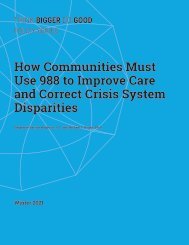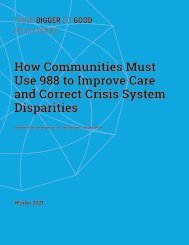Systemic, Racial Justice–Informed Solutions to Shift “Care” From the Criminal Legal System to the Mental Health Care System
You also want an ePaper? Increase the reach of your titles
YUMPU automatically turns print PDFs into web optimized ePapers that Google loves.
Representation and Racism in <strong>Mental</strong> <strong>Health</strong> <strong>Care</strong><br />
Physicians have been shown <strong>to</strong> be less likely <strong>to</strong> accept<br />
Medicaid in areas where <strong>the</strong> poor are non-White (17).<br />
Providers from racial and ethnic minority groups, when<br />
provided <strong>the</strong> opportunity <strong>to</strong> gain medical and mental<br />
health professional expertise, treat a higher proportion<br />
of minority and underserved patients than do White<br />
providers (18). Yet mental health workforce diversity<br />
is lacking—with <strong>the</strong> starkest underrepresentation<br />
being that of Black and Latinx providers (19). Notably,<br />
<strong>the</strong>se populations are <strong>the</strong> same ones that are grossly<br />
overrepresented in <strong>the</strong> criminal legal system, with<br />
a Latinx-White state imprisonment disparity of 1.6<br />
<strong>to</strong> 1.0, and a Black–White disparity of 5.1 <strong>to</strong> 1.0 (20).<br />
Consequently, <strong>the</strong> lived experiences of professionals<br />
providing mental health care, choosing whom <strong>to</strong> care<br />
for, and making mental health procedural and policy<br />
decisions (largely middle- and upper-class White people)<br />
are significantly disparate from <strong>the</strong> lived experiences of<br />
those with mental illness who are overrepresented in <strong>the</strong><br />
criminal legal system. This has implications not only for<br />
where care is provided, but how.<br />
At every stage of mental health care<br />
system involvement, <strong>the</strong> racial and<br />
ethnic groups overrepresented in<br />
<strong>the</strong> criminal legal system, Black and<br />
Latinx people, have poorer outcomes,<br />
compared with Whites.<br />
As defined by Ibram X. Kendi (21), racism is “a marriage<br />
of racist policies and racist ideas that produces and<br />
normalizes racial inequities.” The racially inequitable<br />
products of <strong>the</strong> mental health care system are well<br />
documented and have been for decades (18). At every<br />
stage of mental health care system involvement—i.e.,<br />
access, engagement, assessment, treatment choice, and<br />
retention—<strong>the</strong> racial and ethnic groups overrepresented<br />
in <strong>the</strong> criminal legal system, Black and Latinx people<br />
(20), have poorer outcomes, compared with Whites. When<br />
systems purport <strong>to</strong> be taking steps <strong>to</strong> address <strong>the</strong>se<br />
problems, <strong>the</strong> approaches are often superficial and focused<br />
on <strong>the</strong> underserved populations (i.e., cultural competency<br />
trainings focused on cultural differences, mistrust, and<br />
stigma), ra<strong>the</strong>r than on <strong>the</strong> underserving system.<br />
<strong><strong>System</strong>ic</strong>, <strong>Racial</strong> <strong>Justice–Informed</strong> <strong>Solutions</strong> <strong>to</strong> <strong>Shift</strong> <strong>“<strong>Care</strong>”</strong> <strong>From</strong> <strong>the</strong> <strong>Criminal</strong> <strong>Legal</strong> <strong>System</strong> <strong>to</strong> <strong>the</strong> <strong>Mental</strong> <strong>Health</strong> <strong>Care</strong> <strong>System</strong> 13

















